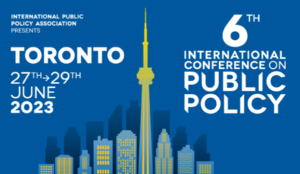T08P05 / Critical Urban Policy
Topic : T08 / POLICY DISCOURSE AND CRITICAL POLICY RESEARCH
Chair : Ronald Vogel (Toronto Metropolitan University)
Second Chair : Meghan Joy (Concordia University )
There is a serious gap between the policy problems faced by 21st century cities and their proposed solutions, which are often small-scale, siloed and unsustainable. Paradoxically, as cities face the pressures of poverty, unemployment, social and physical infrastructure degradation, and pollution, they are being lauded by other scales of government for their resilience and innovation in solving wicked policy problems. And on top of all of that, they were confronted with the deadly impacts of COVID-19.
Critical urban theory and study, situated in the fields of urban geography and politics and exemplified in the seminal texts Cities for People, Not for Profit: Critical Urban Theory and the Right to the City (Brenner et al, 2012) and Critical Urban Studies: New Directions (Davies and Imbroscio, 2010) highlight the failures and inadequacies of neoliberal urban policy and austerity programs characteristic of advanced capitalism. But what is to be done about it? Are there opportunities for progressive and transformational policy as suggested by new municipalism (Comú 2019, Thompson 2019)? Or do cities today lack progressive politics, visions, agendas, revenue sources, governance processes, implementation protocols, and enforcement mechanisms to address growing social, political, and economic problems (Joy and Vogel 2021, 2022).
The tension between problems, solutions, and expectations in status quo urban policy making begs the question: is there a progressive policy alternative for cities that promotes equity, democracy, sustainability, and justice? It is now time for scholars to move beyond critiques of neoliberalism to offer a better future for those who live and work in the city. The objective of this panel on Critical Urban Policy is to examine how policy theory and research can support this agenda (Joy and Vogel 2022).
We welcome both conceptual and case-focused submissions that examine how policy and theory can support efforts to define, build, and action a progressive city in the 21st century. We recognize that the experience of cities in the global south as well as the north offer theoretical insights and practical policy solutions that may move a progressive city agenda forward. We welcome papers that focus on:
- the values and principles that define progressive urban policy;
- the tactics progressive leadership, movements, and coalitions can use to bring progressive alternatives onto the policy agenda;
- the design of progressive policy visions, agendas, and action plans;
- the institutional arrangements required to implement, anchor and nurture a progressive city; and
- how we might evaluate progressive city policy and engage in ongoing learning and critique.






